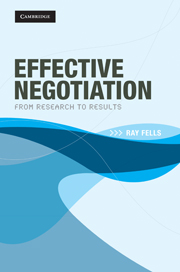Book contents
- Frontmatter
- Contents
- Acknowledgements
- 1 An introduction to negotiation
- 2 The essence of negotiation
- 3 Being strategic
- 4 The process of negotiation
- 5 Managing a negotiation
- 6 Dealing with differences
- 7 Exploring options
- 8 The end-game exchange
- 9 Negotiating on behalf of others
- 10 Cross-cultural negotiations
- Appendix 1 A preparation checklist
- Appendix 2 A negotiation review checklist
- Appendix 3 Self-reflection tools
- Appendix 4 The Strategy Framework
- Appendix 5 The Nullarbor Model
- Appendix 6 Managing competitiveness
- Appendix 7 Managing workplace negotiations
- Appendix 8 Managing a business negotiation
- Appendix 9 A culture checklist
- References
- Index
8 - The end-game exchange
- Frontmatter
- Contents
- Acknowledgements
- 1 An introduction to negotiation
- 2 The essence of negotiation
- 3 Being strategic
- 4 The process of negotiation
- 5 Managing a negotiation
- 6 Dealing with differences
- 7 Exploring options
- 8 The end-game exchange
- 9 Negotiating on behalf of others
- 10 Cross-cultural negotiations
- Appendix 1 A preparation checklist
- Appendix 2 A negotiation review checklist
- Appendix 3 Self-reflection tools
- Appendix 4 The Strategy Framework
- Appendix 5 The Nullarbor Model
- Appendix 6 Managing competitiveness
- Appendix 7 Managing workplace negotiations
- Appendix 8 Managing a business negotiation
- Appendix 9 A culture checklist
- References
- Index
Summary
Negotiators cannot keep differentiating and exploring forever. At some point they have to make a decision to either reach an agreement or walk away. This is the ‘end-game’ where much of the exchanging of offers takes place.
In really competitive negotiations almost the whole negotiation may have been an ‘end-game’ as each side, from the outset, has pressured the other to agree. However, as we have seen, the better negotiators take the process through phases to create value before negotiating over the final outcome. Even so, the ‘end-game’ is still seen as the business end of a negotiation. This chapter examines how to manage this crucial final and often competitive phase. This is another ‘how to’ chapter using the issue, process, action and outcome framework from Chapter 5 and concluding with practical summaries of the three closing strategy options: clear-cut compromise, contend and concede. Because of the competitive nature of the end-game, Appendix 6 – what to do if you find yourself in a boxing match – is relevant.
Exchanging offers
Negotiation is a process where two parties have differences that they need to resolve…By this stage the parties should have a good understanding of what their differences are and why they need to resolve them. This ‘need to resolve’ has probably got a lot to do with their walk-away options being less attractive than the prospects of an agreement.
- Type
- Chapter
- Information
- Effective NegotiationFrom Research to Results, pp. 118 - 131Publisher: Cambridge University PressPrint publication year: 2009



